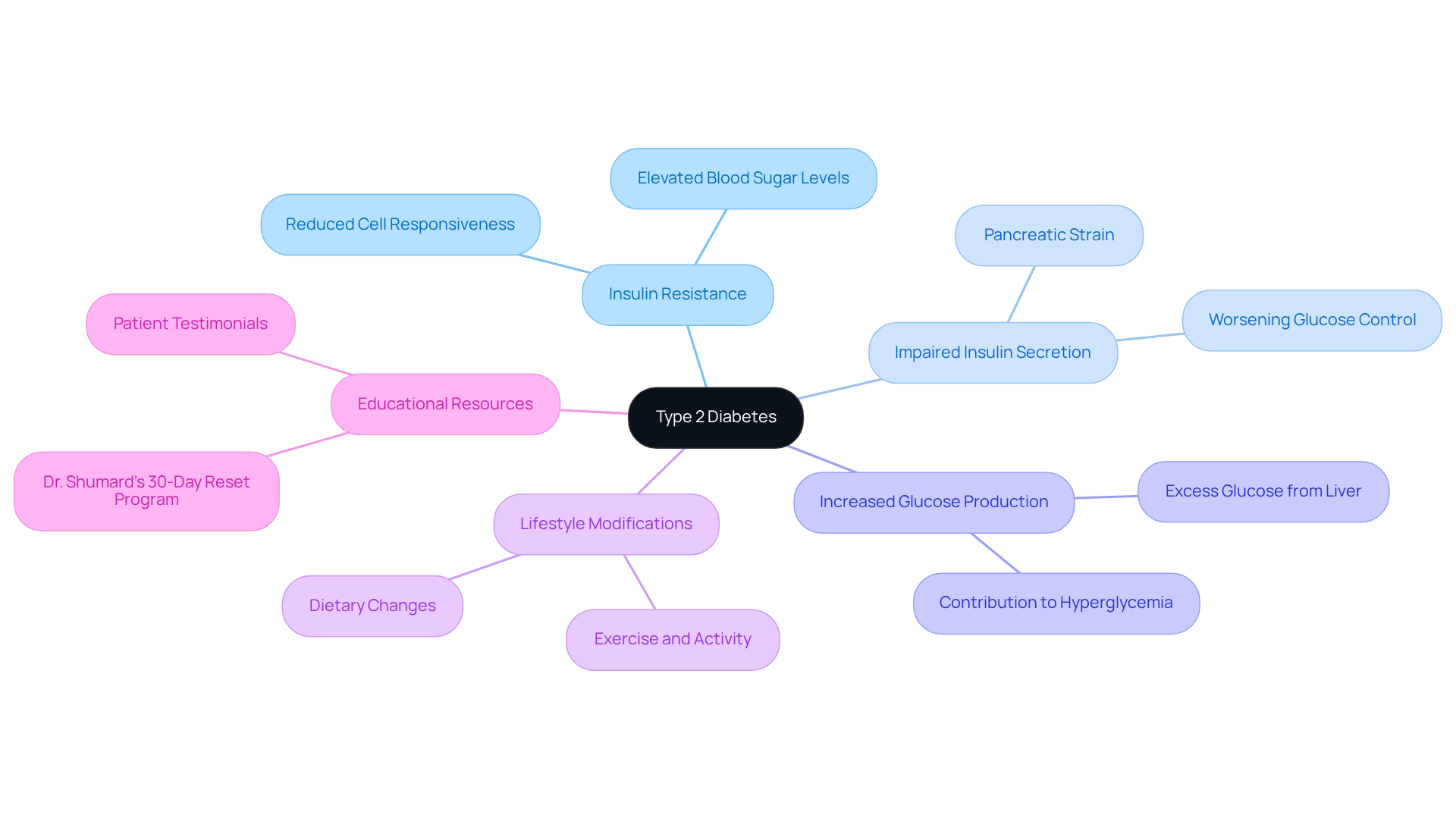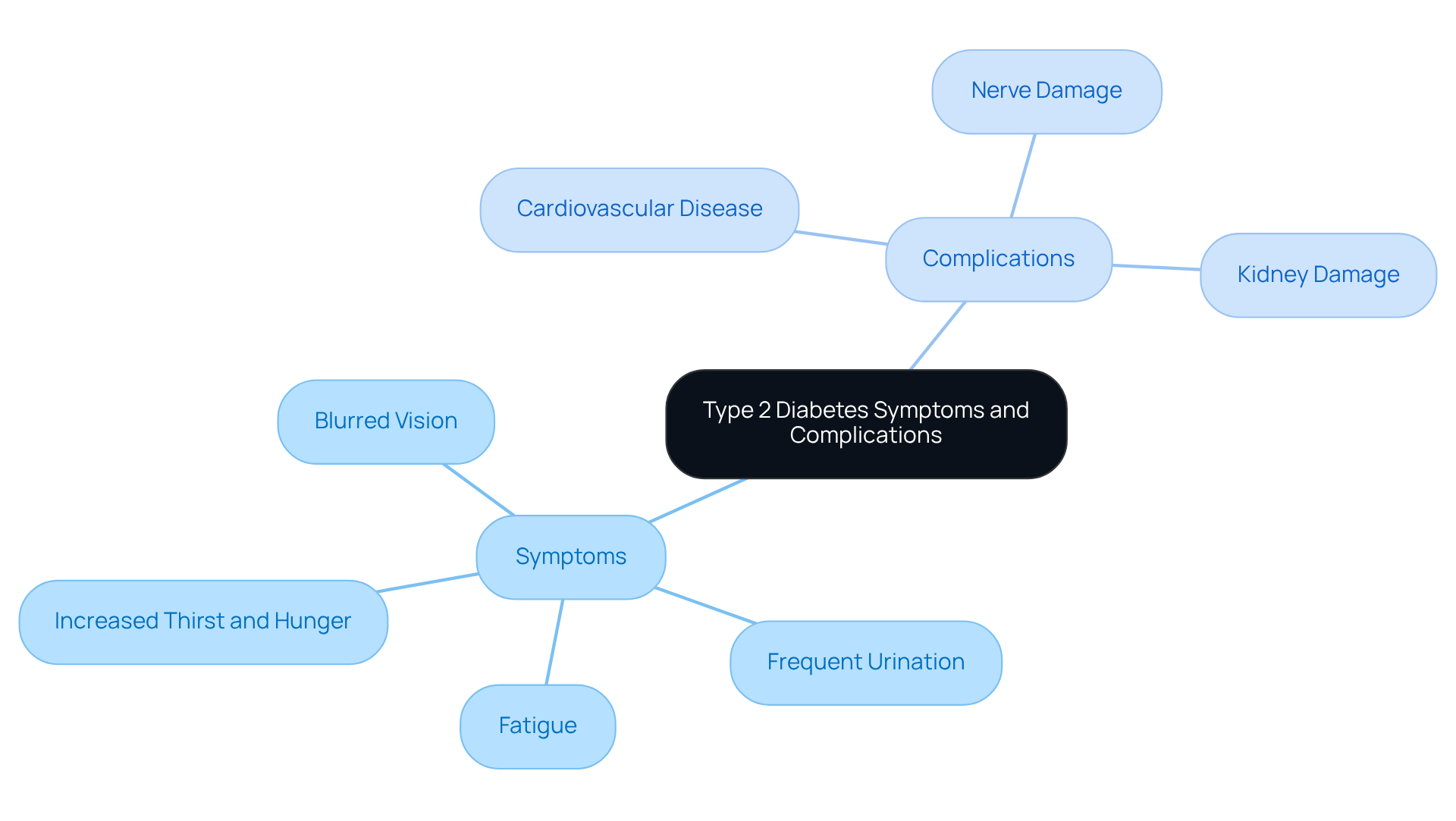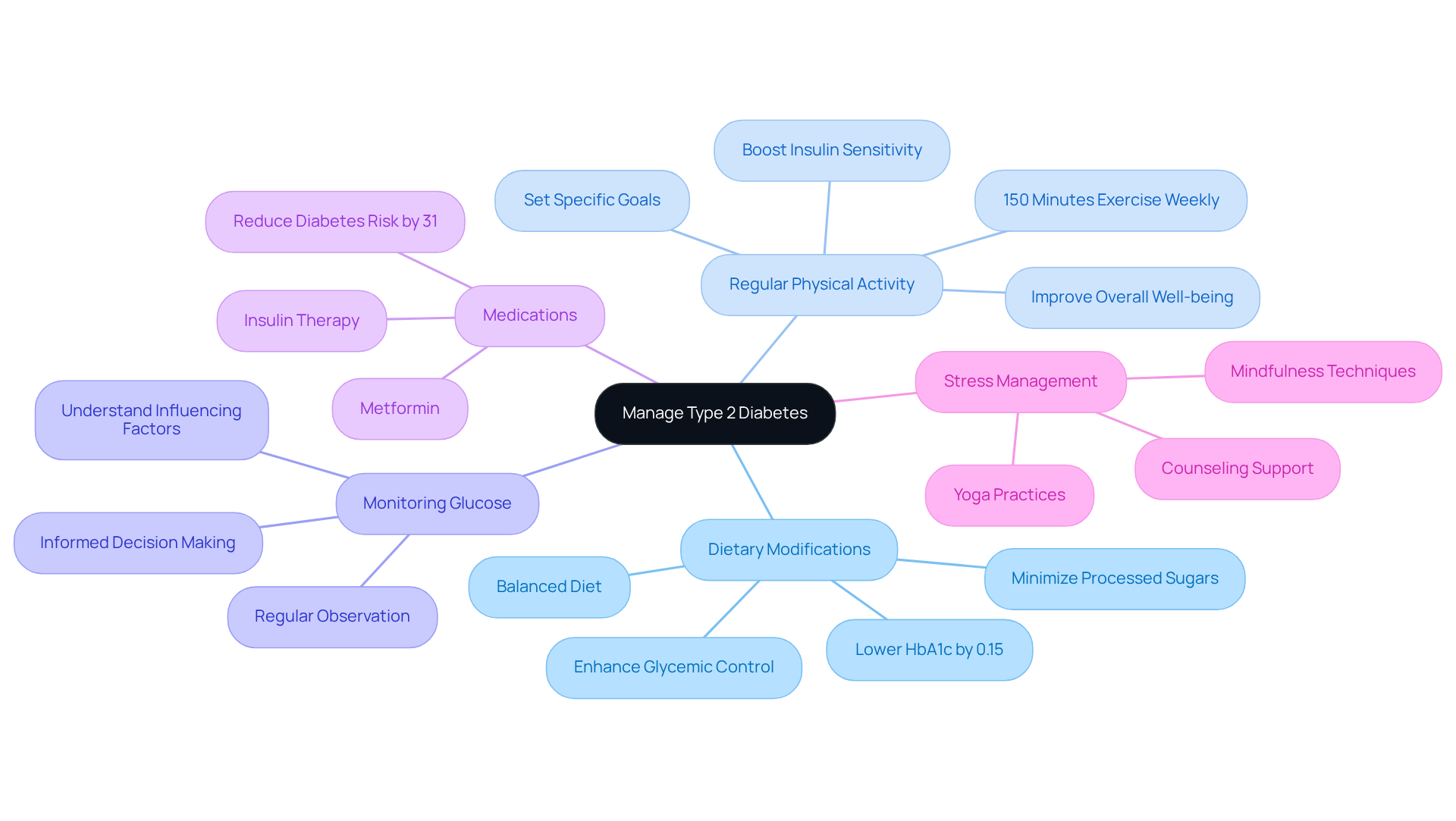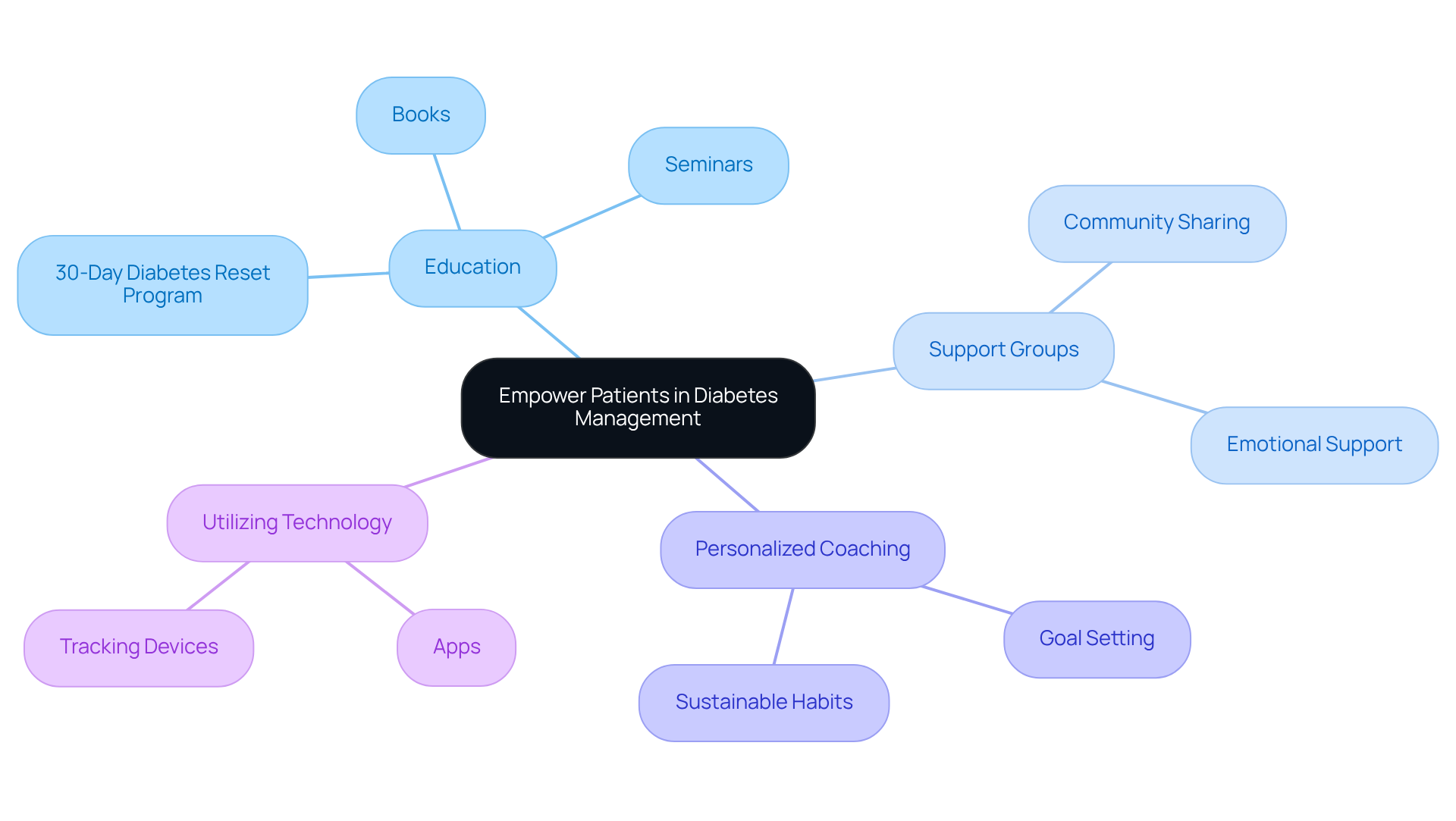Overview
This article delves into the challenges faced by those living with type 2 diabetes, highlighting not only the symptoms but also effective management strategies and the vital role of patient support. It’s important to recognize that managing diabetes can feel overwhelming at times. However, by acknowledging these feelings, we can begin to explore solutions together.
Many patients find that recognizing symptoms is the first step toward taking control. Implementing lifestyle changes can be daunting, yet it is an empowering journey that can lead to significant improvements in health outcomes and overall quality of life. Utilizing educational resources is crucial; they can provide the knowledge needed to make informed decisions.
Imagine the difference it could make to feel supported through this process. By fostering a community of understanding and compassion, we can help each other navigate the complexities of diabetes management. This journey may not be easy, but with the right support and resources, it is certainly achievable. Let’s take the first step together toward a healthier future.
Introduction
Type 2 diabetes has emerged as a significant health crisis, affecting over 100 million Americans and leading to a multitude of symptoms and complications that can drastically alter daily life.
It’s important to recognize how overwhelming this diagnosis can feel, leaving many individuals wondering how to take charge of their health amidst the complexities of this disease.
Understanding the intricate mechanisms behind this chronic condition is vital for effective management and improved health outcomes.
Exploring integrative approaches to management, from lifestyle changes to educational support, reveals empowering strategies that can transform the lives of those affected.
Many patients find that with the right support and resources, they can navigate this journey with confidence and resilience.
Define Type 2 Diabetes: Key Characteristics and Mechanisms
Type 2 diabetes affects many individuals as it is a chronic condition characterized by insulin resistance and relative insulin deficiency. Unlike type 1 diabetes, where the body fails to produce insulin, those with type 2 diabetes can produce insulin, but their cells often do not respond effectively. This can lead to increased glucose concentrations, which result in significant type 2 diabetes effects over time. It’s important to recognize the key mechanisms involved:
- Insulin Resistance: The body’s cells become less responsive to insulin, making it difficult for glucose to enter the cells, which can cause elevated blood sugar levels.
- Impaired Insulin Secretion: Over time, the pancreas may struggle to produce enough insulin to maintain normal glucose concentrations, which can worsen the condition.
- Increased Glucose Production: The liver may produce excess glucose, further contributing to high blood sugar levels.
Many patients find that understanding these mechanisms is crucial for effective management and treatment of the effects of type 2 diabetes. Recent studies indicate that over 100 million Americans are affected by prediabetes and related conditions, highlighting the prevalence of this issue. This awareness emphasizes the need for lifestyle modifications and medical interventions. Specialists in endocrinology stress that addressing both insulin resistance and secretion is essential for reversing the trajectory of the effects associated with type 2 diabetes. By comprehending these processes, individuals can take proactive steps toward overseeing their well-being.
Moreover, Dr. Jason Shumard, D.C., who has postgraduate education in functional endocrinology and clinical nutrition, leads the Integrative Wellness Center, which he founded in 2005 to promote safe alternative treatment options. His holistic approach focuses on empowering patients through personalized functional medicine strategies. His 30-Day Reset program offers practical tools and knowledge to assist patients in managing their condition effectively. By understanding these processes and applying customized nutrition and lifestyle changes, individuals can take proactive measures toward enhancing their well-being, in line with Dr. Shumard’s dedication to reversing type 2 conditions and fostering overall wellness. To discover more about how Dr. Shumard can assist you in regaining your health, consider calling 858-564-7081 or signing up for our upcoming event to obtain a free copy of his book on healing type 2.
Identify Symptoms and Complications: Recognizing the Impact of Type 2 Diabetes
Symptoms of type 2 conditions often develop gradually and can be quite subtle, which makes early identification a challenge. It’s important to recognize that common symptoms include:
- Increased Thirst and Hunger: When blood sugar levels rise, the body signals for more fluids and food, leading to excessive thirst and hunger.
- Frequent Urination: As the kidneys filter out excess glucose from the bloodstream, this results in increased urination—a hallmark symptom of the condition.
- Fatigue: The body’s struggle to effectively utilize glucose can lead to persistent feelings of tiredness and lethargy.
- Blurred Vision: Elevated sugar levels can temporarily affect the lens of the eye, causing vision changes that may improve with better glucose management.
If left unmanaged, the effects of type 2 diabetes can lead to serious complications. Many patients find it helpful to be aware of these risks, which include:
- Cardiovascular Disease: Individuals with diabetes face a significantly increased risk of heart disease and stroke, with diabetes being a leading cause of cardiovascular complications.
- Nerve Damage: Prolonged elevated glucose levels can harm nerves throughout the body, leading to discomfort, tingling, or loss of feeling, particularly in the extremities.
- Kidney Damage: Type 2 diabetes effects can lead to kidney damage, as the condition may impair kidney function, potentially resulting in chronic kidney disease or kidney failure, which can greatly affect overall well-being and quality of life.
Recognizing these symptoms and understanding the potential complications associated with type 2 diabetes effects is crucial for timely medical intervention and lifestyle adjustments. Efficient control of glucose levels can significantly reduce the likelihood of complications associated with type 2 diabetes effects, ultimately enhancing health outcomes and overall well-being.
Incorporating effective strategies for progress tracking can empower patients in managing their condition. For instance, setting SMART goals—specific, measurable, attainable, relevant, and time-bound—can be particularly motivating. Aiming to reduce blood sugar levels or increase physical activity can enhance motivation and accountability. According to the CDC, approximately 29.2% of individuals aged 65 and older in the U.S. have type 2 diabetes, underscoring the importance of awareness and early detection. Dr. Jason Shumard emphasizes that recognizing these symptoms early can lead to better management and improved health outcomes. As one patient shared, “After starting the program, my A1C dropped from 9.1 to 5.7, and I feel more energetic than ever!” This illustrates the transformative impact of proactive management.
Manage Type 2 Diabetes: Integrative Approaches and Treatment Options
Managing type 2 diabetes effectively can feel overwhelming, but it’s important to know that you’re not alone in this journey. A multifaceted approach that combines lifestyle changes, medical treatments, and continuous education tailored to your individual needs can make a significant difference. Here are some key strategies to consider:
-
Dietary Modifications: Emphasizing a balanced diet rich in whole foods, fiber, and healthy fats while minimizing processed sugars and carbohydrates is crucial. Many patients find that making these dietary alterations can lead to significant enhancements in glycemic control. In fact, effective modifications can lower HbA1c values by an average of 0.15%.
-
Regular Physical Activity: Engaging in at least 150 minutes of moderate exercise weekly can enhance insulin sensitivity and support weight management. Setting specific, measurable goals, like reaching 10,000 steps daily, can boost your motivation and accountability. Practical experiences show that individuals who incorporate consistent exercise into their routines often see remarkable improvements in their sugar measurements and overall well-being.
-
Monitoring Glucose Concentrations: It’s important to recognize that regular observation of glucose readings is vital for understanding how different factors, such as diet and exercise, influence sugar concentration. This practice empowers you to make informed decisions about your management strategies.
-
Medications: Depending on your personal situation, medications like metformin or insulin therapy may be essential to maintain optimal sugar levels. Notably, metformin has been shown to lower the likelihood of developing diabetes by 31% in prediabetic individuals, which is encouraging news for many.
-
Stress Management: Implementing stress-reduction techniques such as mindfulness, yoga, or counseling can significantly improve blood sugar control. Stress is a well-known factor that can adversely affect blood sugar management, making its reduction essential for your health.
Incorporating these strategies into your daily life can lead to meaningful improvements in managing type 2 diabetes, allowing you to take control of your health and well-being. If you’re looking for personalized treatment options and innovative methods in glucose management, please reach out to us at Integrative Wellness Center. We’re here to support you every step of the way.
Empower Patients: The Role of Education and Support in Diabetes Management
Empowering patients through education and support is essential for effective management of the effects of type 2 diabetes. It’s important to recognize that many individuals face challenges in navigating their health journey. By prioritizing education and support, patients can gain a greater sense of control over their health, leading to improved outcomes and a higher quality of life.
Educational Resources: Access to books, seminars, and workshops equips patients with vital knowledge about diabetes management and healthy living. Dr. Shumard’s center offers a comprehensive 30-Day Diabetes Reset program, which provides actionable insights and practical tools for wellness transformation.
Support Groups: Many patients find that establishing a community where they can share experiences, challenges, and successes fosters a nurturing environment. Support groups have been shown to improve outcomes related to type 2 diabetes effects by providing emotional support and motivation, helping individuals feel understood and less isolated.
Personalized Coaching: One-on-one coaching sessions assist patients in setting realistic goals, developing sustainable habits, and maintaining motivation. This tailored method improves accountability and promotes proactive wellness management.
Utilizing Technology: Encouraging the use of apps and devices for tracking blood sugar levels, diet, and exercise can significantly enhance self-management. Technology enables real-time observation and offers patients prompt feedback on their wellness behaviors.
Research suggests that community resources and peer support initiatives can maintain advantages for managing the effects of type 2 diabetes. Intervention communities demonstrate notable enhancements in essential clinical metrics like HbA1c and BMI over time. This holistic approach not only addresses the physical aspects of diabetes but also the emotional and psychological challenges faced by patients. Let’s take the first step together toward a healthier future.
Conclusion
Understanding type 2 diabetes is essential for anyone looking to manage their health effectively. This chronic condition, characterized by insulin resistance and impaired insulin secretion, can bring about various symptoms and complications that significantly impact daily life. By grasping the underlying mechanisms of type 2 diabetes, individuals can take proactive steps toward improving their health outcomes and quality of life.
It’s important to recognize the symptoms, such as:
- Increased thirst
- Frequent urination
- Fatigue
As these can lead to serious complications if left unmanaged. Many patients find that implementing strategies for effective management—like dietary modifications, regular physical activity, glucose monitoring, and personalized support—can make a meaningful difference. The role of education and community support systems cannot be overstated; they empower patients to navigate their health journeys with confidence and resilience.
Ultimately, taking charge of type 2 diabetes requires a multifaceted approach that combines knowledge, lifestyle changes, and support. By embracing these strategies and seeking out resources, individuals can enhance their ability to manage this condition effectively. The journey toward better health begins with understanding and action—empowering patients to reclaim their lives and thrive despite the challenges posed by type 2 diabetes.
Frequently Asked Questions
What is Type 2 diabetes?
Type 2 diabetes is a chronic condition characterized by insulin resistance and relative insulin deficiency, where the body can produce insulin but the cells do not respond effectively, leading to increased glucose concentrations.
How does insulin resistance affect individuals with Type 2 diabetes?
Insulin resistance makes the body’s cells less responsive to insulin, making it difficult for glucose to enter the cells, which can result in elevated blood sugar levels.
What happens to insulin secretion in Type 2 diabetes?
Over time, the pancreas may struggle to produce enough insulin to maintain normal glucose concentrations, which can worsen the condition.
How does the liver contribute to high blood sugar levels in Type 2 diabetes?
The liver may produce excess glucose, further contributing to elevated blood sugar levels.
Why is understanding the mechanisms of Type 2 diabetes important for patients?
Understanding these mechanisms is crucial for effective management and treatment of the effects of Type 2 diabetes, allowing individuals to take proactive steps toward overseeing their well-being.
How prevalent is Type 2 diabetes and related conditions in the U.S.?
Recent studies indicate that over 100 million Americans are affected by prediabetes and related conditions, highlighting the prevalence of this issue.
What do specialists recommend for managing Type 2 diabetes?
Specialists in endocrinology stress that addressing both insulin resistance and secretion is essential for reversing the effects associated with Type 2 diabetes.
Who is Dr. Jason Shumard and what does he offer?
Dr. Jason Shumard, D.C., is a specialist in functional endocrinology and clinical nutrition who leads the Integrative Wellness Center. He offers personalized functional medicine strategies and a 30-Day Reset program to help patients manage their condition effectively.
How can individuals learn more about managing Type 2 diabetes through Dr. Shumard’s resources?
Individuals can call 858-564-7081 or sign up for upcoming events to obtain a free copy of Dr. Shumard’s book on healing Type 2 diabetes.



